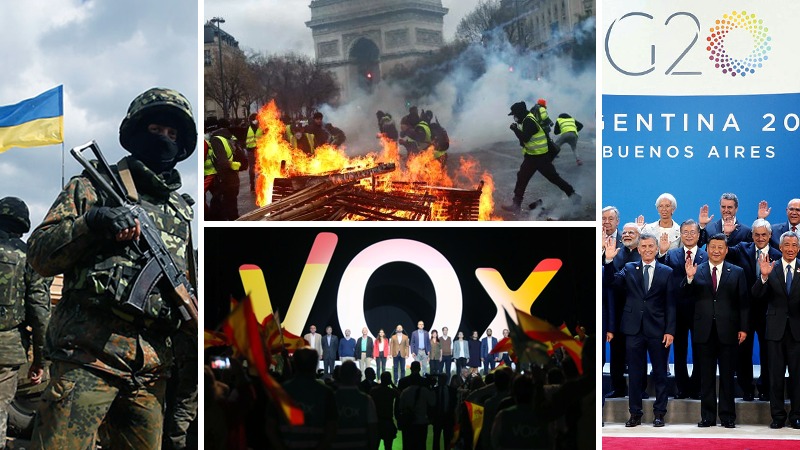Yellow Vests: the Revolution continues
Protests in France continued this week. Other countries, including Belgium, Germany and the Netherlands have also joined the revolution. At the same time the demand for yellow vests, the symbol of protests, has begun to grow in other countries.
According to a Harris Interactive poll, more than 72% of France supports the movement which started in order to oppose increases in prices for motor fuel, reports RTL TV.
Sociologists note that support of the movement among the population is high, however, residents of France condemn the violence which has accompanied the protest actions.
Last Saturday an action by the “yellow vests” in Paris was followed by clashes with police, riots and the burning of cars. More than 400 people were detained.
French president Emmanuel Macron has so far reacted inadequately – instead of opting for dialogue with the people, he has rigidly condemned the actions of the protesters, emphasizing that those responsible for disorder will be punished. The government has so far only agreed to paltry reforms such as a temporary suspension of the gas price hike.
Elections in Spain
Socialists kept the majority of seats in the Parliament of the Spanish Andalusia, but the results nonetheless showed their weakening position. The far-right’ passing into the regional parliament became the main sensation of elections — it is the first time this has occurred in Spain in 40 years.
After calculating nearly 98% of the vote, the socialists took 33 of the 109 places (nearly 29% of the vote), their worst result since 1982.
The right-wing People’s party came in second with 26 mandates (21% of votes), and third place went to the centrist party “Citizens” with 21 mandates (18% of votes).
The left coalition “Forward, Andalusia” (composed of Podemos and United Left) received 17 mandates (16% of the vote).
The far-right VOX party collected 11% of votes and ensured 12 mandates, which was the largest upset and most talked about result of the elections.
The Kerch Conflict
On November 28, the president of Ukraine, Petro Poroshenko, signed a decree on the introduction of martial law in 10 areas of the country. The decree has officially come into force and will remain in place for 30 days. Presidential elections in the country are scheduled to take place on March 31st, 2019, but the current situation may cause delays.
The situation started on November 25th when three Ukrainian ships broke the Russian border in the Kerch Strait and were detained by Russian frontier guards. 24 people – seamen, officers of Naval Forces and the SSU — are facing criminal charges.
The G20 Summit
The g20 summit in Buenos Aires took place from November 30th to December 1st. Following the results of the forum, a final declaration confirming the need for reform of the World Trade Organization (WTO) was adopted, which instills the obligation for countries involved to use all political means necessary to achieve economic growth, to work together to end the sources of the refugee crisis and to render humanitarian aid to immigrants.
Meeting in Astana
On November 28-29th in the capital of Kazakhstan, the next round of negotiations on settling the situation in Syria took place.
Turkey, Iran and Russia condemned the use of chemical weapons in Syria and demanded that the Organization for the Prohibition of Chemical Weapons (OPCW) conduct a professional investigation. The joint statement was adopted following the results of the 11th international meeting on Syria in Astana.

















Leave a Reply